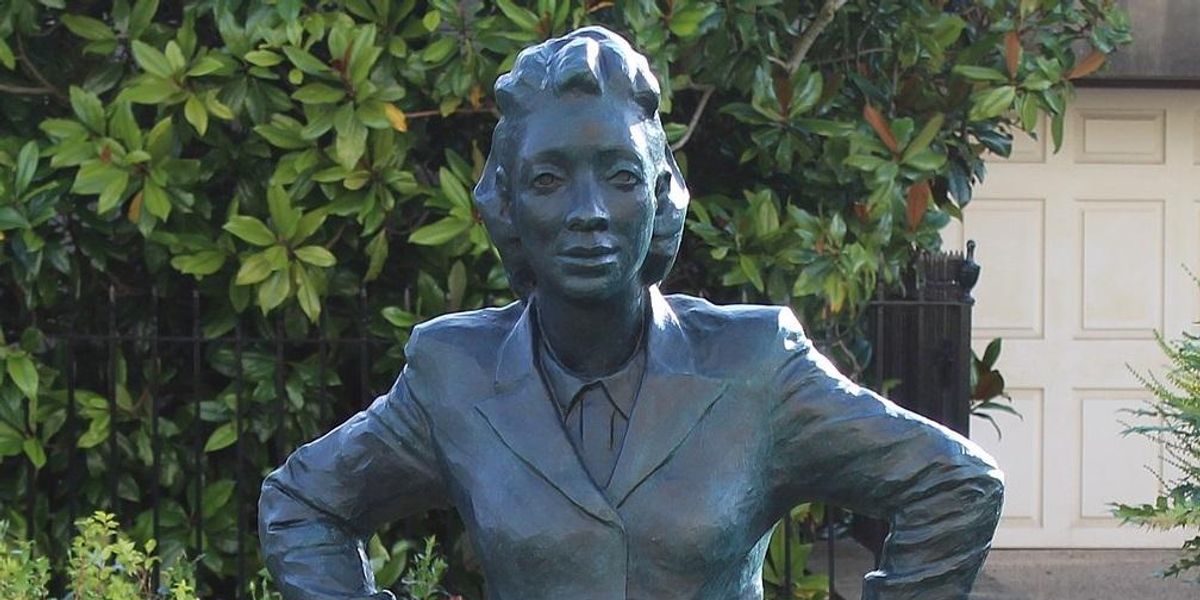Officials in Roanoke, Virginia, announced this week that the city will put up a bronze statue of Henrietta Lacks next year, in a plaza that used to house a statue of Confederate General Robert E. Lee.
Lacks was originally from Roanoke; she died in 1951 when she was just 31, in Baltimore, from cervical cancer. While she was being treated at Johns Hopkins Hospital, one of the only hospitals that admitted Black patients, a gynecologist took a sample of Lacks’s cancer cells without her permission or knowledge, and sent them to a lab. Unlike most of the cell samples collected at the time, Lacks’s cells kept living and dividing, which meant they could be cultured and reproduced over and over again for use in medical research.
Would have been nice if someone had thought to ask Lacks or her family for consent, but it was the ’50s and the medical establishment wasn’t especially concerned with “informed consent” for women cancer patients (at the time, doctors might tell a woman’s husband the diagnosis but withhold it from the patient herself). White researchers took even fewer ethical considerations if the patient was a poor Black woman. But wow, how about that cell line, called “HeLa” cells, for the first letters of Lacks’s first and last names.
Lacks’s life, the history of the HeLa cells, and the ethical mess were the subject of Rebecca Skloot’s 2011 book The Immortal Life of Henrietta Lacks, and if you somehow haven’t come across it you really should try to fill that gap in your reading as soon as possible. Skloot’s book led to posthumous recognition finally going to Lacks and to her family. HeLa cells have been widely used in medical research, were the first human cells to be cloned, were used to map the human genome, and were also used in developing the vaccines for polio and for COVID-19.
At a ceremony Monday in Roanoke, Lacks’s grandson, Ron Lacks, endorsed the plans for the statue, ABC News reports:
“This is an honor and a privilege to be here in Roanoke with my father, Lawrence Lacks, Henrietta’s oldest and only living child,” he said at the ceremony on Monday. “This historical moment, occasion, has been a long time coming.”
The life-sized Lacks statue will be created in bronze by sculptor Larry Bechtel, referencing a drawing by artist Bryce Cobbs, which was shown at the ceremony.

Attorney Ben Crump, who’s representing the Lacks family, said the statue was an appropriate tribute to Lacks and her unintentional scientific legacy.
“I just think it’s so fitting in the state of Virginia … where in the past we commemorated a lot of men with statues that divided us. Now here in Roanoke, Virginia, we will have a statue of a Black woman who brings us all together,” he said.
Crump is also suing the biotech company Thermo Fisher Scientific on the Lacks family’s behalf. The family argues that the company has profited from the growth and sale of HeLa cells without the family’s consent. Crump’s firm says the suit will “lay the foundation for genetic justice.”
The plaza where the Henrietta Lacks statue will be housed was formerly dedicated to Confederate General Robert E. Lee; a statue of Lee was torn down in 2020 during protests against the police murder of George Floyd in Minneapolis. Afterwards, the city decided not to put it back up. Instead, city officials voted to rename the plaza after Lacks and to raise funds for a statue honoring someone actually from Roanoke.
This won’t be the first statue to honor Lacks; in 2021, the University of Bristol unveiled a statue of Lacks by sculptor Helen Wilson-Roe outside Royal Fort House, home to the university’s Faculty of Science offices and a couple of health research institutes. It was the UK’s first public art depicting a Black woman, by a Black woman.
Bristol, you’ll recall, is where Black Lives Matter protesters in 2020 tore down a statue of slave trader Edward Colston and rolled it through the streets to dump it in the harbor. The Lacks statue is not in the same location as the former Colston statue, in case you were wondering.
Here’s hoping that tributes to Henrietta Lacks (and other Black contributors to America) will keep replicating endlessly, eventually replacing all the Confederate statues everywhere.
[Guardian / ABC News / Johns Hopkins / The Immortal Life of Henrietta Lacks (Wonkette sales link) / Photo: “’14GTR,” Creative Commons License 4.0]
Yr Wonkette is funded entirely by reader donations. If you can, please give $5 or $10 a month to help us keep bringing you the nice times news)
























































![Key Metrics for Social Media Marketing [Infographic] Key Metrics for Social Media Marketing [Infographic]](https://www.socialmediatoday.com/imgproxy/nP1lliSbrTbUmhFV6RdAz9qJZFvsstq3IG6orLUMMls/g:ce/rs:fit:770:435/bG9jYWw6Ly8vZGl2ZWltYWdlL3NvY2lhbF9tZWRpYV9yb2lfaW5vZ3JhcGhpYzIucG5n.webp)





















